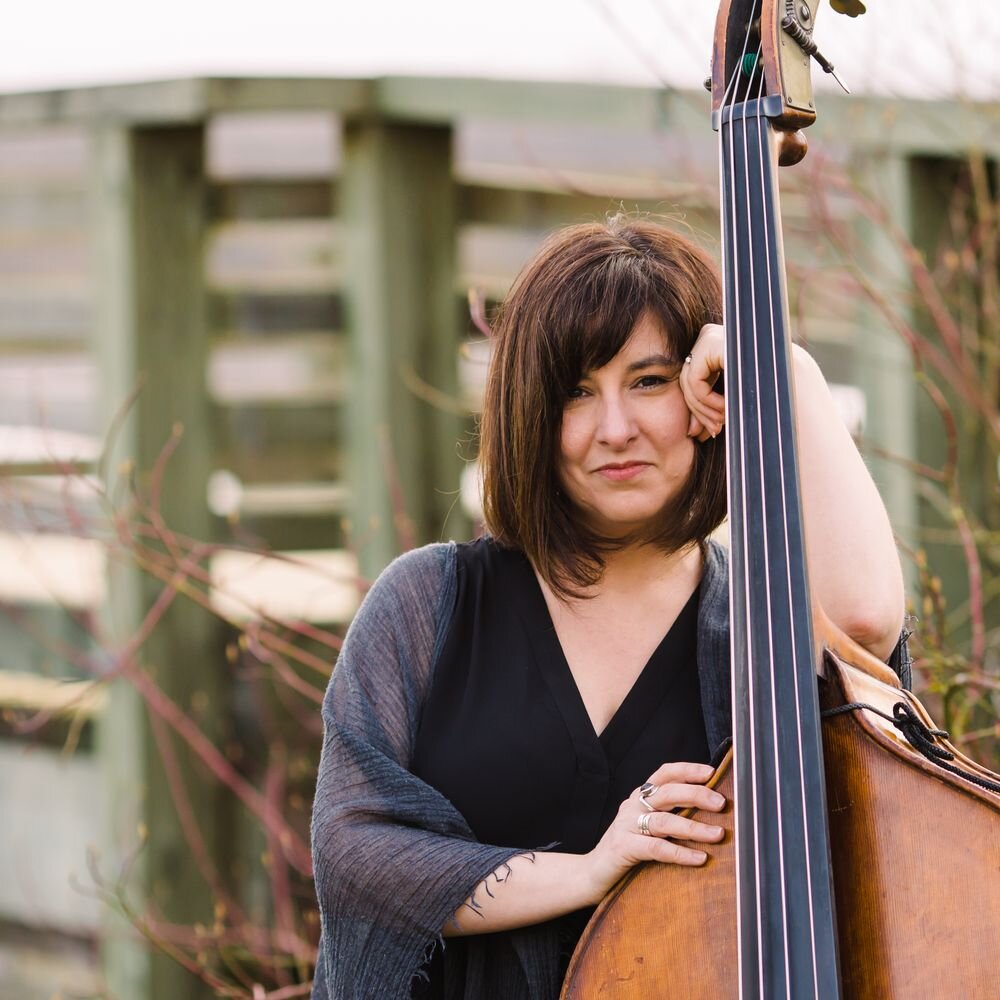Bassist Jodi Proznick brings joy of jazz to Vetta Chamber Music—and aims to get more women in the field
Tango Klezmer Jazz is a new virtual concert featuring four of Canada’s leading female musicians
Jodi Proznick hopes to get more women playing jazz instruments.
Vetta Chamber Music presents Tango Klezmer Jazz online from March 11 at 2 pm PST to March 14 at midnight PST. A live chat with the artists and composers takes place March 14 at 2 pm PST.
VANCOUVER’S JODI PROZNICK was in Grade 9 when she first plucked a bass in her Surrey high-school band class under the direction of her dad, an award-winning music educator. She switched to stand-up bass in Grade 12. Even though she was thinking of pursuing medicine in her post-secondary studies, she received a scholarship to study bass at McGill University. Her family built a crate to ship her instrument across the country.
With Juno nominations to her name, Proznick has gone on to open for Oscar Peterson, collaborate with the likes of PJ Perry and Michel Bublé, perform at the 2010 Winter Olympics, lead her own quartet, get a Master’s degree in music education, and more, earning a reputation as one of the country’s finest jazz musicians. She’s passionate about making music accessible to kids regardless of their socioeconomic backgrounds. And at this stage in her career, she has another goal: to get more women playing jazz instruments.
The industry remains male-dominated. Saxophonist Issie Barratt calculated in 2016 that women make up just five percent of jazz instrumentalists. That same year, a survey of jazz musicians in Germany showed that four out of five were men. The gender disparity is so extreme that in the fall of 2018, Berklee College of Music launched the Berklee Institute of Jazz and Gender Justice, which focuses on equity in the field and the role that jazz plays in the larger struggle for gender justice. (Its founder is drummer, producer, and educator Terri Lyne Carrington, who made history as the first woman to win a Grammy in the Best Jazz Instrumental Album category for Money Jungle: Provocative in Blue, a reimagining of the Duke Ellington classic.)
“There are more female firefighters than [female] jazz musicians,” Proznick says in an interview with Stir. “The numbers are terrible….The music world is notorious for stories of it being extremely oppressive and morally bankrupt at times; quite frankly, a lot of these spaces and places a woman would never want to enter. My way of thinking is: What are you going to do about it? If you’re not part of the solution you’re part of the problem. How can I help in any way?
“I want to amplify women artists I know in any way I can,” she says. “Let’s collaborate with other genres to be able to make art together.”
Jodi Proznick.
One way Proznick is doing that is by performing in Tango Klezmer Jazz, a new digital concert by Vetta Chamber Music. Recorded live at the Chan Centre for the Performing Arts at UBC and streaming March 11 to 14, the show brings together four female musicians and composers at the top of their game. Joining Proznick are Jane Hayes on piano, Julia Nolan saxophone, and Vetta artistic director Joan Blackman on violin.
A contemporary exploration of works in eclectic genres, the program features pieces by Maurice Ravel, George Gershwin, Srul Irving Glick, Serban Nichifor, and Astor Piazzolla. Vetta commissioned Vancouver composer Fred Stride for a piece (“Four Stellar Jays” is named in honour of the artists, whose first names all start with J), while Proznick composed “Sun Song Suite” based on her larger song cycle, Sun Song.
The concert is a departure of sorts for Vetta. While the organization has delved into tango and klezmer in the past, this is its first sojourn into the world of jazz. The way Proznick sees things, this cross-pollination is music’s way forward.
“As an artist I’ve been very interested in collaborative work, and over the past few years personally I have been actively involved in some really interesting poly-genre configurations,” says Proznick, pointing to projects with Vancouver Chinese Music Ensemble, Chor Leoni Men’s Choir, and sitarist Mohamed Assani, to name but a few. “I think we’re really at a point where we need to stop boxing ourselves in in terms of genre. It kind of limits us. We need to raise ourselves out of those boxes and look for kindred spirits who are brilliant musicians—that’s where really interesting things are going to start to happen.
“When Joan approached me for Tango Klezmer Jazz, I was all over this,” she adds. “Julia has done jazz, but it was a brand-new world for Joan and Jane, and they were willing to take that risk and be vulnerable and do some improvising. I was so happy to support that curiosity.”
Blackman agrees she was stepping into new territory by collaborating with Proznick and playing jazz. However, she soon found herself on common ground.
“In my years in the VSO, we played back up for many great jazz artists, so I had a basic intuitive understanding of the sound and feel of the music, but the way they would solo, taking off into a freedom of expression, this was not something I thought I could ever do,” Blackman says. “Yet we classical musicians make many creative decisions when we play. We make micro-choices about articulation and length of notes, and we mold the phrases according to our interpretation of the composer’s wishes. In jazz, there is a structure too. There is a rhythmic grounding, and the harmonies change which notes are preferred in a riff.”
Although jazz has more choices than givens, Blackman says, the process of performing in Tango Klezmer Jazz made her realize that, musicians or not, we’re always making micro choices in our daily lives. No two moments are ever the same. “We might start noticing that we are actually improvising all the time, choosing the reaction we want for the given situation, improvising with the ebb and flow, the chords that life deals us,” Blackman says.
It could be said that Proznick has been improvising her whole life, too. Back in high school, she first started playing oboe, learning throughout Grade 8 that it just wasn’t for her. Even though she had never seen a girl play bass before, she picked it up because that’s what her dad needed in the band at the time. The bass she plays now is the same one she’s had for 22 years or so, a hearty 1950s-era Emanuel Wilfer model made of German spruce with a maple back: “It’s been knocked around and had beer spilled on it,” she says. “It’s jazz, right?”
She recalls loving the instrument right away, but she never dreamed she’d go on to experience the kind of fruitful career she has built. “People saw potential in me that I didn’t see in myself,” she says. “A five-foot-two woman playing double bass in the jazz world? I didn’t even think this was a possibility…. I came in through the back door, through the band room in the public school system. That’s what I want to see in the world: there are all these pathways to these moments of collaboration and beauty. It isn’t always through the Conservatory model, but we need that too.”
What’s far more important in music isn’t perfection, Proznick says, but emotion—and for jazz players in particular, abandon.
“In my world, it isn’t about being exact; that’s not the highest priority,” Proznick says. “The priority is wholeheartedness, being on the edge, and going for it.
“This concert is rhythmic, joyful, melodic, and wholehearted by four really, really wholehearted musicians,” she says. “I think that comes across in the music and ties it all together.”
For more information about Tango Klezmer Jazz, visit Vetta Chamber Music.














